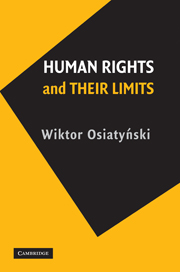4 - Rights and Cultures
Published online by Cambridge University Press: 05 June 2012
Summary
Another important debate concerns the universality of rights. Actually, when applied to human rights, the term universality is almost tautological. Universality is implied in the very word human, which means that rights belong to every human being at all times and in all situations. Such a statement, however, clearly defies observable reality. Most people throughout history have not enjoyed their human rights. Therefore, we talk about the universality of standards. Every human being should have her human rights recognized and observed, and every community should attempt to reach such a standard. This universality of standards is justified by the fact that it is what protects the dignity of every person and makes human cooperation possible.
The concept of human rights provides universal legitimacy to all those who oppose tyrannies, oppression, and the violation of human rights, anywhere in the world. Despite the widespread (one could say “universal”) problems with their violation, human rights are universal in the “normative” sense of global adherence to human rights norms and treaties. Almost all governments have signed the UDHR and ratified various human rights treaties. Far less universal are the actual observance of these treaties, fulfillment of the resulting obligations, and adherence to formally accepted standards.
Debates about human rights initially concerned mainly the justification for such failures and violations. Because human rights consist of a number of norms and serve various values that can be in conflict with one another, justification has been sought through the prioritization of rights, with many attempts made to place certain rights before others.
- Type
- Chapter
- Information
- Human Rights and their Limits , pp. 144 - 186Publisher: Cambridge University PressPrint publication year: 2009

